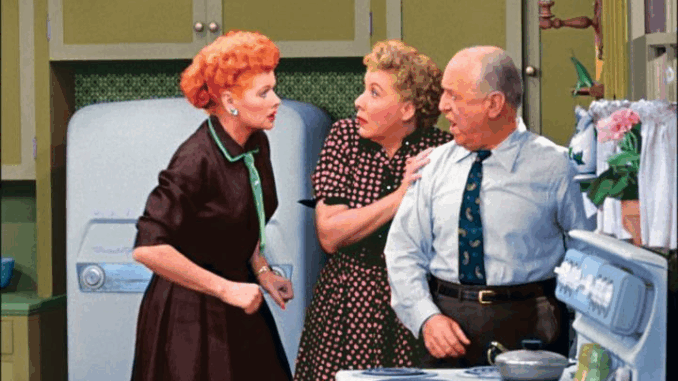
When I Love Lucy entered its sixth and final season (1956-1957), the series was already a television phenomenon that forever changed the landscape of American entertainment. Starring Lucille Ball and Desi Arnaz, the show had captivated millions with its unique blend of slapstick comedy, heartfelt moments, and groundbreaking production techniques.
A Legacy That Transcended Time
From its debut in 1951, I Love Lucy broke barriers: it was the first scripted series filmed before a live studio audience, pioneering the multi-camera setup that became an industry standard. Lucille Ball’s physical comedy and impeccable timing, paired with Desi Arnaz’s charm as Ricky Ricardo, created a magic that transcended generations.
By the sixth season, the Ricardos had settled into suburban life, reflecting many American families’ realities in the 1950s. This change brought a more domestic, situational comedy tone, different from the frenetic antics of earlier seasons.
Shifts in Storytelling
The final season featured storylines focusing on family life, parenting challenges with “Little Ricky,” and the couple’s adjustments to the suburbs of Westport, Connecticut. While some fans missed the zany hijinks of Lucy’s earlier exploits, the season maintained its humor through clever writing and warm character development.
Episodes like “Lucy and Superman,” where Lucy hilariously dons a superhero cape, reminded audiences why the show remained so beloved. The chemistry between Lucille Ball and Vivian Vance (Ethel Mertz) was as strong as ever, anchoring many of the season’s best moments.
Behind the Scenes: Real Life vs. Reel Life
Behind the cameras, Lucille Ball and Desi Arnaz’s marriage was experiencing strain, and their eventual divorce in 1960 marked a bittersweet contrast to the on-screen love story. Nonetheless, their professionalism ensured the show’s quality remained high throughout the final season.
The Show’s End and What Came Next
The official end of I Love Lucy didn’t mean the end of the Ricardos. The couple continued their characters in The Lucy-Desi Comedy Hour, hour-long specials that ran until 1960, exploring new situations with the same charm.
Today, I Love Lucy’s final season stands as a testament to television’s golden age — a reminder of how humor, heart, and innovation created timeless entertainment.
